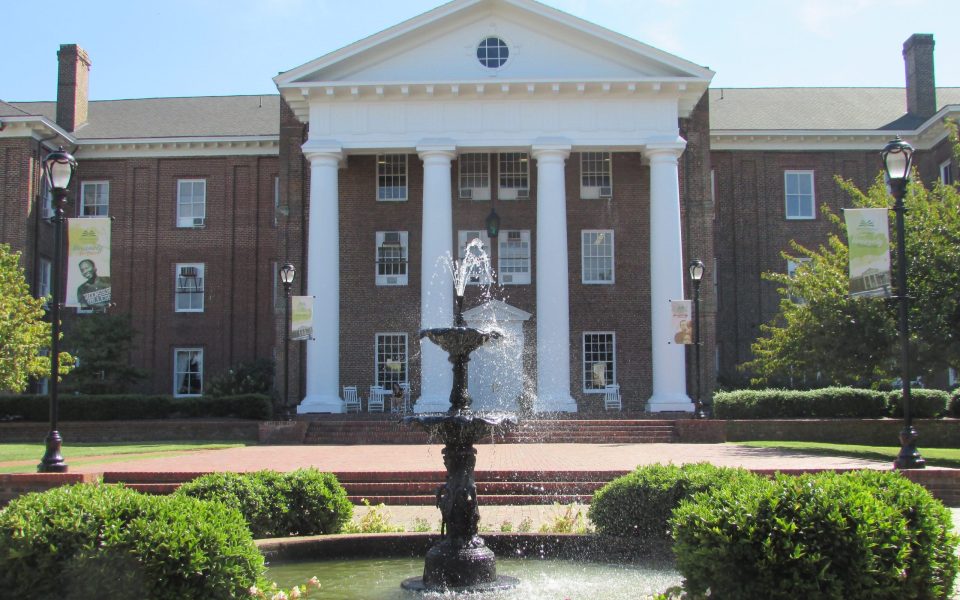by Eric Ginsburg
Greensboro College responds to sexual harassment that happened when first-years attended a student play about sexual violence, and the playwright hopes it is an opportunity for change.
It’s “almost ironic,” playwright Michaela Richards said, that this sort of sexual harassment and “completely inappropriate” behavior would happen at the first performance — a practice run, really — of her play.
The Greensboro College senior wrote It Stops Here, a play designed to take a hard look at sexual violence and harassment that incorporates firsthand experiences of people she interviewed. The small, historically Methodist Greensboro College embraced the piece, making it required viewing for different populations on campus.
Athletic teams came together to witness it, and were “absolutely fantastic audience members,” Richards said, particularly the baseball team: Several players approached her afterwards to thank her for the eye-opening piece.
But it was the first run of the play, a condensed version before the costumes and lights were officially set in a performance that occurred during the first-year seminar class for new students, where the trouble happened.
Rude, sexual remarks. Catcalls. Phrases and gestures during a scene about rape. Sexual comments directed at specific members of the cast.
In some ways, this is exactly why Richards wrote the play. It isn’t that Greensboro College in particular has a pervasive climate of sexual harassment or assault; it’s college campuses in general that need to be much more proactive in addressing it, she said.
“This is the first year that our school has really talked about sexual violence,” she said. “This really could’ve happened anywhere, and how many schools would’ve said yes to doing this play in general?”
Richards, who added that she wishes the school did something like the play every year, is proud to be affiliated with the school. That isn’t just because Greensboro College agreed to make the play mandatory for incoming students and embraced it more broadly, but because of the swift response to the play’s hecklers.
Spokesperson Lex Alexander said that the school opened a Title IX investigation immediately after the loud comments that were “sexual and abusive in nature.”
Alexander and Richards declined to list specific comments that were made, with Alexander emphasizing that he wasn’t present, but he added, “I understand that one or more participants were making masturbation sounds at one point.”
The comments and actions of some audience members were considered “sufficiently abusive and directed at individual performers on stage, and that’s key; they were not just booing the performance generally,” Alexander said.
Robin Daniel, the college’s executive vice president and chief operating officer who is also a licensed professional counselor, is handling the investigation, Alexander said. If he finds anyone responsible “for having created a hostile environment,” Alexander said, they will be “subject to some form of discipline,” though he said he is unsure of the range of possible consequences.
“We’re talking about freshman college students who had been here all of three weeks,” he said. “We’re not looking to chop anybody’s heads off in this case, we’re trying to make it a learning experience for all involved.”
Alexander couldn’t offer an expected timeline but said he anticipates that it will be “fairly quick” and that the college president expects to make an announcement once it is complete, though the outcome may not be public.
Richards characterized the school’s response as “awesome,” and said the school has been given the opportunity to be a leader on addressing sexual harassment and assault.
“This has kind of forced our school to look at our policy and figure out what’s wrong with it and change it, which is exactly what I wanted [the play] to do,” she said. “As long as something happens to deal with this situation, I’m very happy with how the situation is being handled so far.”
Greensboro College’s board of trustees actually adopted a revised sexual harassment and assault policy earlier this year, Alexander said, though there is still more the school can do.
“[This] is an indicator of why the play is important and how much education remains to be done,” he said. “We have a policy, but we also have a ways to go in learning and teaching each other about what that means in the real world.”
Join the First Amendment Society, a membership that goes directly to funding TCB‘s newsroom.
We believe that reporting can save the world.
The TCB First Amendment Society recognizes the vital role of a free, unfettered press with a bundling of local experiences designed to build community, and unique engagements with our newsroom that will help you understand, and shape, local journalism’s critical role in uplifting the people in our cities.
All revenue goes directly into the newsroom as reporters’ salaries and freelance commissions.


Could they have been motivated to do this to promote this play? Seems odd about the whole situation.